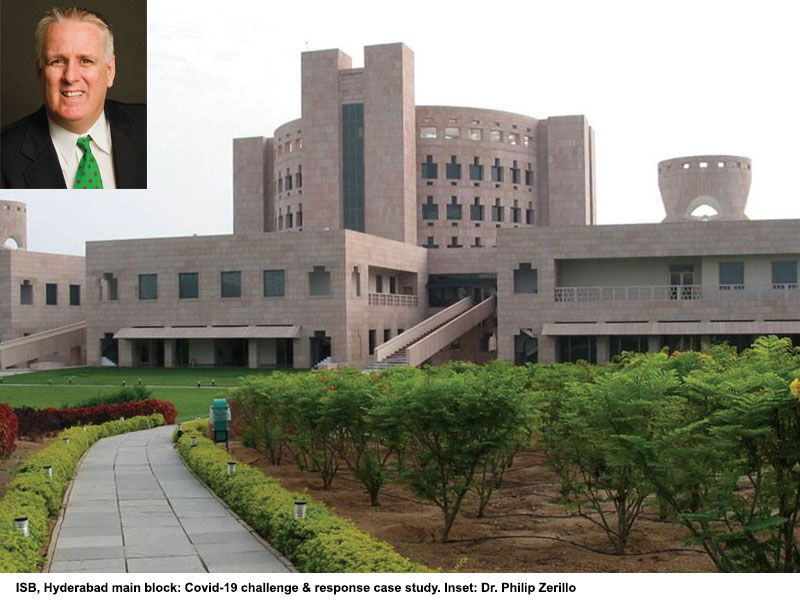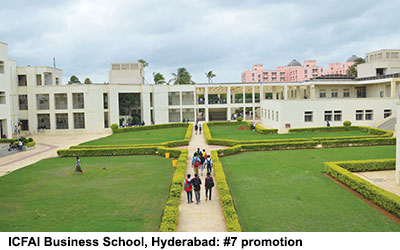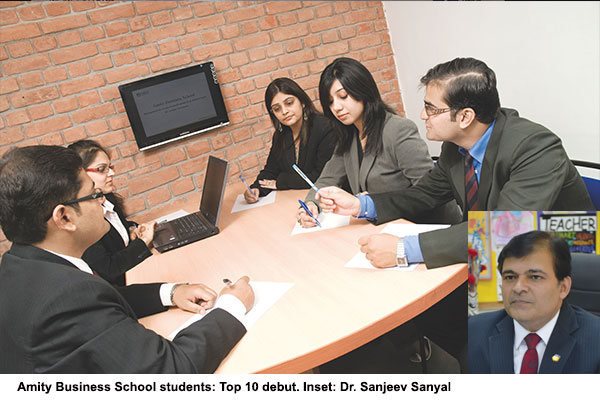Although India’s top-ranked private B-schools can’t be blamed entirely given the tight policy framework within which they ave had to operate, the country has paid a heavy price for poor quality business management education – Dilip Thakore

If one takes post-independence India’s unimpressive national development record — for over 40 years until India’s notorious neta-babu controlled licence-permit-quota economy was substantially dismantled in 1991, annual GDP growth averaged a mere 3.5 percent or 1.3 percent per capita after adjusting for runaway population growth — no
 country needs high quality organisation and business management education as much. Even currently, the annual rate of GDP growth, which briefly averaged 7 percent in the first decade of the new millennium, has dropped to 5 percent in this resources rich country gifted with a naturally entrepreneurial population.
country needs high quality organisation and business management education as much. Even currently, the annual rate of GDP growth, which briefly averaged 7 percent in the first decade of the new millennium, has dropped to 5 percent in this resources rich country gifted with a naturally entrepreneurial population.
In sharp contrast, the annual GDP growth rate in the neighbouring People’s Republic of China (PRC) — which
is also endowed with a naturally entrepreneurial population — averaged 10 percent per year between 1978-2010 and 8 percent since, despite continuous interference by officials and cadres of the 100 million-strong Communist Party of China. If PRC had been a free enterprise economy like breakaway Taiwan, it’s quite possible that its GDP ($14 trillion) would have surpassed the massive GDP of USA ($21 trillion). Against this India’s GDP which was on a par with PRC in 1978, is a mere $3 trillion (Rs.227 lakh crore). Although they can’t be blamed entirely, given the government policy framework within which they have had to operate (India’s famous Indian Institutes of Management (IIMs) and Indian Institutes of Technology (IITs) are promoted and governed by the Central government), the country has had to pay a heavy price for poor quality business management education.
“The collective track record of India’s reportedly 5,500 B-schools is disappointing. Their focus has been on the tactical aspects of business management within a meekly accepted framework. Their contribution to ideating productive economic and business policies has been negligible. They have conspicuously failed to gift the country
with great, visionary and risk-taking entrepreneurs such as G.D. Birla, Walchand Hirachand, J. N & J.R.D Tata who built great manufacturing enterprises unfortunately stunted by post-independence India’s foolish embrace of socialism. Barring a few exceptions in the 1990s, most B-school alumni have become civil servants of the private  sector. Although they have done relatively well in finance and consulting, India’s B-school graduates have shown marked reluctance to dirty their hands in manufacturing industries. They are adept at producing power point presentations rather than products,” says Jaitirth (‘Jerry’) Rao in a scathing indictment of India’s B-schools. A former Citibank (India) CEO, Rao transformed into an entrepreneur and promoted the well-known IT services company Mphasis Ltd (estb.1998) and later, two affordable housing companies — VBHC Value Homes Pvt. Ltd (2008) and Home First Finance Co. India Ltd (2010). Himself an IIM-Ahmedabad graduate his latest contribution to society is The Indian Conservative — A History of Right-Wing Thought (2019).
sector. Although they have done relatively well in finance and consulting, India’s B-school graduates have shown marked reluctance to dirty their hands in manufacturing industries. They are adept at producing power point presentations rather than products,” says Jaitirth (‘Jerry’) Rao in a scathing indictment of India’s B-schools. A former Citibank (India) CEO, Rao transformed into an entrepreneur and promoted the well-known IT services company Mphasis Ltd (estb.1998) and later, two affordable housing companies — VBHC Value Homes Pvt. Ltd (2008) and Home First Finance Co. India Ltd (2010). Himself an IIM-Ahmedabad graduate his latest contribution to society is The Indian Conservative — A History of Right-Wing Thought (2019).
According to Guarav Singh, a Gurgaon-based senior manager in the well-known consultancy firm Ernst & Young, 3,500-plus business management schools and institutes licensed by the All India Council for Technical Education (AICTE) with an aggregate enrolment of 588,000 postgraduate students, are providing diploma and degree approved study programmes across India. Only 10 percent of MBA students — 60,000 — qualify for admission into the Top 100 B-schools. The remainder are in B and C grade B-schools learning wasteful, slapdash business management practices (jugaad) for which Indian industry has acquired notorious global reputation. On the bright side, Singh believes that the online learning given wing by the Covid-19 pandemic crisis is likely to provide a substantially larger number of business management students access to study programmes of the Top 100 B-schools (see p.76).
Against this backdrop of the collective failure of the country’s B-schools to produce entrepreneurs and business leaders sufficiently equipped to catapult India into the league of second, let alone first world nations, we commissioned Centre for Forecasting & Research Pvt. Ltd (C fore estb.2000) — the well-known Delhi-based market research and opinion polls company — to conduct a nationwide field survey and prepare a league table ranking the country’s most respected private B-schools.
Your editors are of the opinion that inclusion of government B-schools in the exercise would result in domination
of the league table by the six pioneer IIMs sited in Ahmedabad, Bangalore and Calcutta, Lucknow, Indore and Kozikhode which routinely top all media league tables. With entry into these capital-intensive government B-schools restricted to a mere 5,000 students per year, it makes greater sense to assess private business management institutes which absorb the great majority of B-school aspirants every year.
Accordingly, to conduct the latest EW India Private B-schools Rankings 2020-21, 150 C fore field personnel persuaded 1,279 knowledgeable sample respondents comprising a mix of B-school faculty and industry representatives countrywide, to rate India’s most well-reputed 100 private B-schools on 12 broad parameters and 55 sub-parameters of academic excellence. The parameters: leadership, faculty welfare and development, competence of faculty, student intake process, curriculum and pedagogy, industry interface, research culture, infrastructure, placements, internationalism, life/soft skills education and value for money.
The sample respondents were asked to award perceptual scores to B-schools on these parameters given differing weightages with research (400), infrastructure (400), industry interface (400) and placements (500) accorded highest weight. “The ranking was based on objective data collected from B- schools directly, from secondary sources plus a perceptual survey conducted among faculty and industry,” says Premchand Palety, the founder CEO of C fore (estb.2000) explaining the rankings methodology.
Unsurprisingly, for the second year in succession, the Indian School of Business, Hyderabad (ISB, estb. 2001) promoted by the leading lights of India Inc with a capital investment of over Rs.200 crore on a 265-acre, state-of-the-art campus in Gachibowli in suburban Hyderabad, is ranked India’s #1 private B-school by a comfortable
margin ahead of XLRI — Xavier School of Management, Jamshedpur ranked #2 for the second year consecutively. Previous to 2018, ISB was not assessed by C fore because it offers a compressed one-year MBA diploma programme (cf. the standard two-year programme offered by most B-schools). However in 2018 the exclusion of ISB was rescinded on the advice of our Board of Advisors and unsurprisingly this now 19-year-old B-school, routinely
ranked among global Top 30 by the London-based Financial Times, was immediately promoted to the head of top table.
“All of us are delighted to learn that ISB is standing tall in the EW rankings. This is a proud and fulfilling moment for team ISB and we heartily thank and congratulate Education- World, for its in-depth research and objective assessment. This accomplishment will surely stimulate us to scale greater heights and set new standards in global business education,” says Dr. Philip Zerillo, an alum of Texas University and the Kellogg School of Business, North-Western University, USA (and a former radio jockey and stand-up comedian) with teaching experience in his alma maters, Emory University, USA and the Singapore Management School. Zerillo signed up with ISB last year and is
currently deputy dean, corporate and international relations at ISB, which also has a Mohali (Punjab) campus.
Although Zerillo is reluctant to comment on ISB’s most satisfactory parameter score on grounds that all 12 parameters are “thought out and most opportune”, he confesses this path-breaking B-school’s top scores on the parameters of competence of faculty, curriculum and pedagogy and research capability, are the most satisfying. Zerillo is equally satisfied with this top-ranked B-school’s response to the challenges posed by the closure of all education institutions in India — including ISB — following outbreak of the Covid-19 global pandemic.
Managing the Covid-19 pandemic was one of the toughest challenges that has confronted ISB. We had to take some quick decisions in terms of campus evacuation, logistics, pending classes and a host of other issues. But the ISB team rose to the occasion, made things happen and rolling. Remaining sessions/ classes were offered online for students to complete their study programmes. Each faculty member decided how his/her online content would be structured
and bifurcated into live synchronous and pre-recorded asynchronous sessions. These rapid re-alignments and
re-configurations worked out very well and our concerted efforts were rewarded when we hosted our firstever online e-graduation ceremony on April 11 for our Class of 2020. We believe this class is equipped to take any challenge head-on and will play a catalytic role in nation-building and global transformation of business and industry in the post Covid-19 age,” says Zerillo.
With ISB and XLRI retaining their top ranks of last year, further down the Top 10 table, there’s a minor reshuffle of the seating order. The wellreputed Management Development Institute (MDI), Gurgaon at #3 and S.P. Jain Institute of Management & Research, Mumbai #4 have retained their 2019-20 rankings followed by the Narsee Monjee Institute of Management Studies at #5 (6 last year) jointly with IMT Ghaziabad.
 Beyond the Top 5, the Xavier Institute of Management, Bhubaneswar at #6 (8) and the ICFAI Business School (IBS), Hyderabad #7 (10) have risen in esteem of the informed public while TAPMI, Manipal has retained its #7 ranking. The Symbiosis Institute of Business Management, Pune which has yielded a rank at #8, the International Management Institute, Delhi #9 and K. J. Somaiya Institute, Mumbai #10 (11) jointly with the Amity Business School, Noida, complete the Top 10.
Beyond the Top 5, the Xavier Institute of Management, Bhubaneswar at #6 (8) and the ICFAI Business School (IBS), Hyderabad #7 (10) have risen in esteem of the informed public while TAPMI, Manipal has retained its #7 ranking. The Symbiosis Institute of Business Management, Pune which has yielded a rank at #8, the International Management Institute, Delhi #9 and K. J. Somaiya Institute, Mumbai #10 (11) jointly with the Amity Business School, Noida, complete the Top 10.
Dr. Sanjeev Sanyal, director of the Amity Business School, Noida (ABS, estb. 1994) sited within the 84-acre, state-of-the-art campus of its parent Amity University (ranked #3among India’s private universities), is not surprised that ABS is ranked among the country’s Top 10 private B-schools “This year ABS is celebrating its 25th year of existence, and all these years we have routinely been awarded Top 10 ranking by several publications and agencies. evertheless it’s a humbling moment and the outcome of the strong and durable links ABS has built with India Inc. Our curriculums are designed in close collaboration with some of the country’s top-ranked companies which ensures that our students are industry ready when they graduate. This also results in excellent placements for which ABS is well known. Continuous improvement and updation of teaching-learning and research is a way of life for us at ABS. For this I am thankful to the faculty and our students who have worked collaboratively under the visionary leadership of our chancellor Dr. Atul Chauhan to establish the good reputation of ABS,” says Sanyal, an alumnus of Jamia Milia Islamia and Delhi universities who signed up with this new genre B-school in 2005, was appointed director of ABS in 2012 and dean of the faculty of management studies of Amity University in 2015.

Like Dr. Zerillo of IBS, Sanyal is also pleased with the well-wired ABS’ rapid response to the Covid-19 crisis. “Amity University in general and ABS in particular, took proactive action and shifted to online classes as early as March 16 to prevent interruption of our students’ education. Training faculty members to deliver online lectures also began well in advance to ensure seamless continuation of classes with almost total student participation until April 2. Since then, webinars in which industry experts and business professionals engage with students, are a regular feature of our curriculum. And lastly, we are in the process of testing proctored examinations to be conducted online. I believe
that in ABS and Amity University, we have managed the severe disruption of the academic calendar very well,”
says Sanyal. Currently ABS has 1,534 students mentored by 82 faculty on its muster rolls.
Beyond the Top 10 in the 82-strong league table of sufficiently well-reputed private B-schools countrywide, several high-potential B-schools have substantially risen in the esteem of knowledgeable monitors (i.e, B-school faculty and industry representatives) of business management education in India. Among them: IFIM Business School, Bangalore, is promoted to #12 (#15 in 2019-20); Rajagiri Centre for Business Studies, Kochi #12 (18); Goa Institute of Management #14 (17); Institute of Management, Nagpur #14 (22); Amrita School of Business, Coimbatore #16
(20) and #1 in Tamil Nadu (pop. 72 million); Balaji Institute of Modern Management, Pune #18 (23); SDM Institute for Management Development, Mysore #21 (29); J.K Business School, Gurgaon #23 (40); and Jaipuria Institute of
Management, Lucknow #25 (37). These B-schools apart, several others across the country are getting their act together and are rising up the annual EW Private B-schools league table.
Abhishek Singhania, co-founder and vice chairman, and Sanjiv Marwah, director of the J.K Business School,  Gurgaon (JKBS, estb. 2006), profess mild enthusiasm that this superbly equipped and fullywired B-school, which was the first in India to be approved by Google Inc to conduct online classes using its Google Suite software — “way before declaration of the national lockdown decreed on March 25” — has been given a huge promotion this year.
Gurgaon (JKBS, estb. 2006), profess mild enthusiasm that this superbly equipped and fullywired B-school, which was the first in India to be approved by Google Inc to conduct online classes using its Google Suite software — “way before declaration of the national lockdown decreed on March 25” — has been given a huge promotion this year.
“Quite frankly, I believe we would have got a higher ranking after audit. JKBS has the huge advantages of 125 years of business legacy and experience of the JK Group which was a pioneer in several industries including aluminum products, industrial chemicals, jute, plastic, paints, sugar, oil & soap, nylon, paper, rayon, polyester, acrylic, garments, electronics, cement, steel belted radial tyres. In addition we have a great faculty with a deep research culture as indicated by our high score under the parameter of research,” says Marwah, director of JKBS which has 240 graduates mentored by 45 full-time and visiting faculty on its muster rolls.
Adds Singhania: “A major headache of corporate India is the huge investment in time and money required to train even B-school graduates. The USP of JKBS is that we nurture and develop industry-ready graduates who are usually on-boarded in 15-20 days. That’s why we have an excellent placements record.”
In this connection it’s important to note that private B-schools which may be modestly ranked nationally are often top-ranked in their host states, some of which are as populous as European countries. For instance the IFMR Business School of the newly inaugurated Krea University, ranked India #13, is the top-ranked B-school of Andhra Pradesh (pop. 49 million); Amrita School of Business, India #16 is #1 in Tamil Nadu (pop. 67 million); and the Institute of Management of Nirma University at #16 India is the highest ranked private B-school of Gujarat (62 million) and JKBS is #2 in Haryana (25 million).
It’s arguable that state rankings have assumed new importance in the aftermath of the Covid-19 crisis which has discouraged inter-state travel and mobility for the foreseeable future.



























